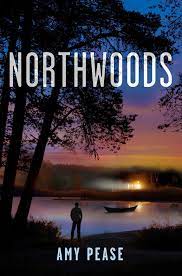 This debut by Amy Pease takes on a lot. Her flawed hero, Eli North, is a vet with PTSD and a drinking problem. He’s lost the job he loved, and his wife has left him – plus he works on sufferance for his mother, the sheriff, at the understaffed sheriff’s department in tiny Shaky Lake, Wisconsin. His co-workers don’t think much of him but his mother is doing her very best to pull him forward. He defeats her efforts at almost every turn as addicts tend to do.
This debut by Amy Pease takes on a lot. Her flawed hero, Eli North, is a vet with PTSD and a drinking problem. He’s lost the job he loved, and his wife has left him – plus he works on sufferance for his mother, the sheriff, at the understaffed sheriff’s department in tiny Shaky Lake, Wisconsin. His co-workers don’t think much of him but his mother is doing her very best to pull him forward. He defeats her efforts at almost every turn as addicts tend to do.
As the book opens, Eli ignores a call from work and when he does get to it, it’s a noise complaint. He finds an empty resort cabin with the music playing full blast. He turns it off, and, checking out the nearby dock, finds a boat tied up with a dead body inside. His first panicked thought is that it’s the body of his boy, Andy, but he sees the boy in the boat is too old – he’s a teen. It also becomes clear that the girl he was with is missing.
As Eli and his mother investigate the case one way and another, the fact that the dead boy seems to have been a good kid, trying to care for his addict mother (he even knows how to administer Narcan), is something confirmed by everyone they talk to. The sheriff tried to check in on him as she was able to, and she’s devastated by his death. The missing girl, however, takes precedence.
This book is interesting as it’s told from the point of view of an addict, the ultimate unreliable narrator. Eli is struggling and the reader sees and feels his struggles, most heartbreakingly, I think the struggles he has trying to maintain a relationship with his 8-year-old son, Andy. There’s obviously a good, intelligent investigator under cover of the alcohol. I think the true triumph of this novel is in creating a character who, despite obvious flaws, is still someone the reader can relate to, root for, and even like. I wanted him to succeed.
The mystery revolves around the missing girl and the drug her pharmacist rep father is about to help launch that’s supposed to stop opioid addiction. Obviously, any company that could manufacture that kind of drug would make billions of dollars. The stakes are both high, and personal, with the various addicts Pease writes about giving the reader an emotional investment in the outcome.
That said I still felt the resolution was somewhat predictable. I rarely try and figure out an ending, preferring to be surprised, but this ending was pretty apparent even to me. I did like the writing, the setting, and the characters. The Wisconsin Northwoods felt very much like Northern Michigan where I spent my childhood summers. That layer of nostalgia along with the poignancy of the main character’s struggles made this a worthy read. — Robin Agnew